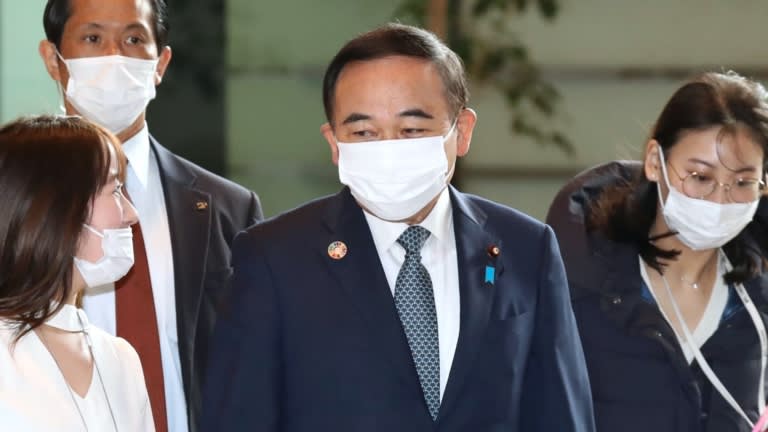Japan appoints Minister of Loneliness to tackle suicide rates

Telework and the lack of social gatherings during Japan’s fight against the coronavirus have left people feeling increasingly stressed and lonely. Pandemic-linked isolation has been blamed for the first uptick in Japanese suicides in 11 years.
Recognizing a serious problem, Prime Minister Yoshihide Suga on Friday launched a designated cabinet post to alleviate social isolation. Tetsushi Sakamoto, who has been tapped for the job, will work as the coordinator for efforts across multiple ministries and agencies.
“Women especially are feeling more isolated and face increasing suicide rates,” Suga told Sakamoto. “I’d like you to examine the issue and put forward a comprehensive strategy.”

Sakamoto is slated to assemble a team dedicated to interagency communication, and will host an emergency forum with advocacy groups and other players as early as this month to identify top priorities. Suga, in particular, noted a rise in suicides among women, he said.
“I hope to promote activities that prevent loneliness and social isolation and protect the ties between people,” Sakamoto told reporters following their meeting. His other cabinet responsibilities include regional revitalization, as well as addressing Japan’s falling birthrate.
Sakamoto said he could coordinate with the health ministry on suicide prevention and with the agricultural ministry on food banks, for example. “We will work on a comprehensive approach to arrange a wide range of measures,” he said.
The U.K., which has appointed a designated loneliness minister in 2018, has an isolation problem with its older people, Sakamoto explains in his homepage. In Japan, on the other hand, loneliness afflicts across different age groups, including children, young people, women and older people, he observes, seeing the need for thorough research.
Isolation can often be exacerbated during natural disasters and other catastrophes. Following the Great Hanshin earthquake of 1995 and the Fukushima earthquake and tsunami of 2011, many older victims had no choice but to move into temporary housing, where they later died with nobody at their bedside. Such solitary deaths, called kodokushi in Japanese, have become a major public concern in Japan.
The pandemic has only made matters worse. Encouraged to stay home and to avoid crowded or close-contact situations, older Japanese who are not used to communicating online have become more isolated from the outside world.
Even younger, tech-savvy generations have struggled with protracted social-distancing efforts. Closed offices and schools mean they have less contact with colleagues and friends. Many have also lost jobs, adding economic stress to their situation.
The Japanese government believes such challenges have contributed to the increase in suicides — by 750 to 20,919 in 2020, according to preliminary data from the police and the health ministry. This is the first increase since 2009, just after the global financial crisis.
While suicides among men fell for the 11th straight year, suicides among women rose for the first time in two years to 6,976. A total of 440 elementary, middle and high school students had also died by suicide as of November, the highest number since 1980.
Japan also had the highest suicide rate out of any of the Group of Seven leading industrial nations, at 14.9 suicides per 100,000 individuals, according to the Organization for Economic Cooperation and Development. Much of these deaths have been attributed to health and economic problems, which could only worsen as the coronavirus pandemic drags on.
Lawmakers from both the ruling Liberal Democratic Party and the opposition have called for efforts to alleviate loneliness in Japanese society.
“We need to create a measure to assess involuntary isolation, so we can create policy based on objective data,” said Yuichiro Tamaki, who leads the opposition Democratic Party for the People.
Young LDP lawmakers launched a study group last January to discuss the issue, with plans to submit recommendations to government as early as next month. “In order to lay the groundwork for effective policies, we want to come up with a clear definition of loneliness so we can visualize what is happening,” said Takako Suzuki, one of the architects of the study group.
“In Japan, solitude can be seen as a virtue and something you are ultimately responsible for addressing yourself,” said Junko Okamoto, president of consultancy Glocomm and an expert on social isolation. “The government needs to swiftly conduct foundational research and craft strategy based on scientific evidence.”
“There is an understanding in the U.S. and Europe that the emotional toll of loneliness can lead to heart disease and numerous other conditions,” she said, adding that the creation of the new cabinet post could help raise awareness for the issue.
Japan’s government has yet to come up with specific measures to address the situation. But it could model its efforts after the U.K., which appointed a minister for loneliness and published a “Loneliness Strategy” in 2018.
The U.K. includes loneliness as a topic in government surveys, and works with local governments and volunteer organizations to assist at-risk groups like the youth and the unemployed. Research has found that at least 13% of the population felt alone, and that disconnected communities may be costing the British economy 32 billion pounds ($44 billion) a year.








